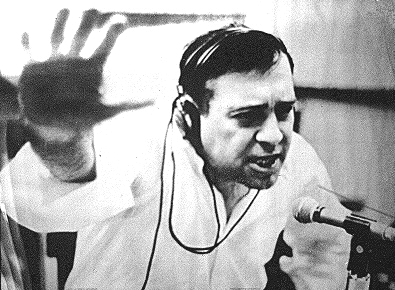
You might want to take a break from watching the televised “A Christmas Story” marathon to read Donald Fagen’s appreciation of its creator, Jean Shepherd. Like Fagen, I listened to Shep on WOR/New York when I was much younger, entranced by his ability to communicate, drawn into the world he created every night.
Shepherd’s talk usually fell into one of four categories. Fans of A Christmas Story will be familiar with the basic comic tone of his Depression-era tales, elaborations on his experience growing up in Hammond, Ind., a Chicago suburb in the shadow of the U.S. Steel Works on Lake Michigan. These stories featured his manic father (“the old man”); his mother (always standing over the sink in “a yellow rump-sprung chenille bathrobe with bits of dried egg on the lapel”); his kid brother, Randy, and assorted pals, bullies, beauties, and other neighborhood types. While the film preserves much of the flavor of Shep’s humor, not much remains of the acid edge that characterized his on-air performances. In the film, the general effect is one of bittersweet nostalgia; on the radio, the true horror of helpless childhood came through.
Then there were the stories culled from his three years in the stateside Army during World War II (a juvenile ham radio and electronics freak, he was assigned to the Signal Corps). The third hunk of material was informed by his adventures in postwar radio and TV. He seems to have done every possible job, from engineer to sportscaster to hosting live cowboy music broadcasts. Finally, there was the contemporary stuff, comments on the passing scene.
In between, he’d sing along to noisy old records, play the kazoo and the nose flute, brutally sabotage the commercials, and get his listeners—the “night people,” the “gang”—to help him pull goofy public pranks on the unwitting squares that populated most of Manhattan. In one famous experiment in the power of hype, Shepherd asked his listeners to go to bookstores and make requests for I, Libertine,a nonexistent novel by a nonexistent author, Frederick R. Ewing. The hoax quickly snowballed and several weeks later I, Libertine was on best-seller lists. (Shep and sci-fi author Theodore Sturgeon eventually codged together an actual novel for Ballantine Books. I owned a copy.)
Unlike Fagen, I enjoyed Shep in person, twice traveling to Princeton to see him onstage. I devoured his books, too. In fact, 30 years ago, when my mother-in-law asked me to record a book for the Talking Books program she runs in Hartford, Connecticut, I agreed, on the condition that I could read Shep’s “In God We Trust (All Others Pay Cash).” Having listened to him nightly in high school, I tried to bring his characters to life the way he did, although my then-twenty-six-year-old voice wasn’t as deep and mellifluous as his.
About a decade ago, I went to the Chicago area to play in a poker tournament the first time, and couldn’t help but smile as I crossed into the Indiana suburb where the Horseshoe casino is located. Yep, it’s was Shep’s old hometown, Hammond.
Jean Shepherd was a unique American entertainer. I’m glad that some of his stories live on in both print and that annual holiday television tradition.
Read Donald Fagen’s full piece here.
Here’s a Jean Shepherd tribute page with lots more about the man (lots of links, too).
